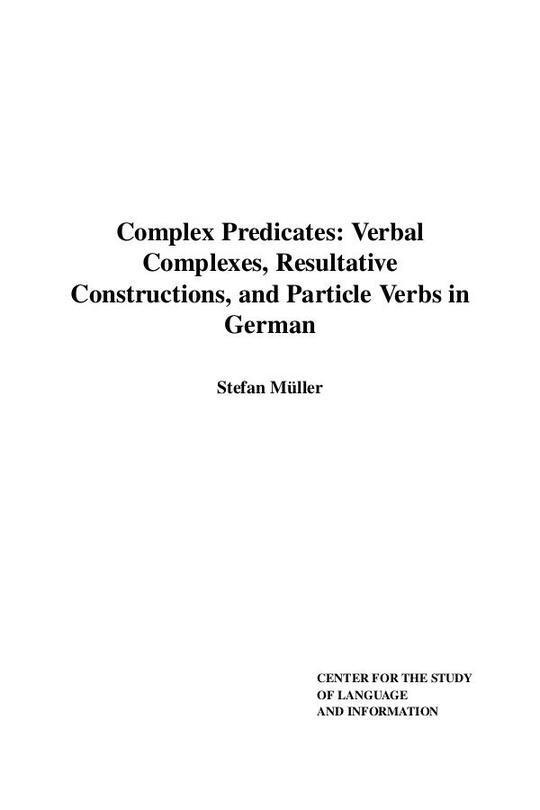
Complex Predicates
Free
Description
Contents
Reviews
Language
English
ISBN
Unknown
Introduction
Background: The German Sentence Structure and its HPSG Analysis
Topological Fields
Signs and Types
The Representation of Lexical Entries
Case Assignment
Head-Argument Structures
The subj Feature
Head-Adjunct Structures
Lexical Rules
The German Clause
Verb Placement
Verb-Second
Summary
The Predicate Complex, Control, and Raising
The Phenomena
The Terminology
Coherent vs. Incoherent Constructions
Scope of Adjuncts
Permutation in the Mittelfeld
Intraposition
Extraposition
Fronting
Raising and Control
Expletive Predicates and Subjectless Constructions
Identity vs. Coindexing
Subject Raising Verbs
Scope of Adjuncts
Permutation in the Mittelfeld
Intraposition and Extraposition
Subject Control Verbs
Scope of Adjuncts
Permutation in the Mittelfeld
Intraposition and Extraposition
Object Raising Verbs: AcI Verbs
Scope of Adjuncts
Permutation in the Mittelfeld
Intraposition and Extraposition
Expletive Predicates and Subjectless Constructions
Object Control Verbs
Scope of Adjuncts
Permutation in the Mittelfeld
Intraposition and Extraposition
Obligatorily Incoherent Verbs
Copula Constructions
Scope of Adjuncts
Permutation in the Mittelfeld
Intraposition and Extraposition
Fronting
Expletive Predicates and Subjectless Constructions
Subject and Object Predicatives
Scope of Adjuncts
Permutation in the Mittelfeld
Intraposition and Extraposition
Fronting
Expletive Predicates and Subjectless Constructions
Passive
The Analysis
Tense-Auxiliaries
Complex Fronting
Subject Raising Verbs
Subject Control
Object Raising Verbs: AcI-Verbs
Object Control
Copula Constructions
Subject and Object Predicatives
Alternatives
Linearization Based Theories
Flat Structures without Verbal Complex
Binary Branching Structures without a Verbal Complex Schema
Obligatory Coherence as a Subcase of Optional Coherence
Proposals without an Additional Selection Feature
Summary
Passive
The Phenomena
Unaccusativity
Agentive Passive
Stative Passive
Dative Passive
Remote Passive
Modal Infinitives
lassen Passive
The Analysis
Agentive Passive
Stative Passive
Dative Passive
Modal Infinitives
Remote Passive
lassen Passive
Adjectival Forms
Alternatives
Kathol
Kathol and Pollard
Kathol
Ryu
Summary
Depictive Secondary Predicates
The Phenomena
Antecedent Elements
Non-Overt Antecedents
Reference to Oblique Antecedents
Reference to Objects of Nominalized Verbs
Reference to Non-Arguments
Reference to Elements inside of Arguments
Coordination of Depictive Predicates
The Case of the Subject of the Depictive Predicate
Linearization
Linearization with Respect to the Antecedent
Fronting
Linearization in the Mittelfeld
Iteration
Focus Projection and Stress
The Analysis
Alternatives
Permutation in the Mittelfeld
Coordination
Summary
Resultative Secondary Predicates
The Phenomena
Non-Selected Accusatives
The Interpretation of the Accusative and Fake Reflexives
Resultatives with Transitive Verbs
The Middle Construction
Adjectival Participles
Nominalizations
Transitivization
Expletive Predicates and Subjectless Constructions
Passive
Unaccusative Verbs
Permutation in the Mittelfeld
Intraposition
Extraposition
Fronting
Iteration
The Analysis
Alternatives
Summary
Particle Verbs
The Phenomenon
What are Particle Verbs?
Stress
Fronting
Referentiality
Depictives and Resultatives vs. Lexicalized Forms
The Syntactic Activeness of Particles
Adjectives: Comparatives and Superlatives
Nouns: Modification and Passivization
Verbs: Passive, Double Infinitives, Scope
Fronting
Simple Fronting
What Can be Fronted?
Why Are these Frontings Possible?
Complex Fronting
Fronting of Complements and Particles
Fronting of Adjuncts and Particles
The Impossibility of Fronting the Base Verb
Linearization
The Right Sentence Bracket and Intraposition into the Mittelfeld
Permutation in the Mittelfeld
Particle Placement in German Dialects
Iteration of Particles
Particle Verbs and Heads that Select for Another Predicate
Subject and Object Predicatives
Resultative Predicates
Prefix Verbs vs. Particle Verbs
Nominalizations in German Dialects
Non-Productive Particle Verb Combinations
Productive Particle Verb Combinations and Argument Structure
Inflection, Derivation, and the Bracketing Paradox
Inflection
Derivation
Nominalizations
ung-Nominalizations
-er-Nominalizations
Ge- -e-Nominalizations
Nominalizations of Infinitival Forms
Adjective Derivation
-bar-Derivation
Non-Existing Bases
Visibility and Modularity
Conclusion of the Data Section
The Analysis
Lexical Entries for Nontransparent Particle Verbs
Lexical Items for Productive Particle Verb Combinations
Particle Fronting
The Verbal Complex in Thuringian
Morphology
Unary Projections, Lexical Rules, and (Empty) Elements
Syntax
Morphology
Inflection
Derivational Morphology
Nominalizations
Adjective Derivation
Alternatives
Discontinuous Lexical Entries
Rebracketing and Lexical Relatedness
Paradigm Functions
Linearization-Based Morphology
Summary
A Comparison with Other Approaches to Complex Predicates
The Complexity Constraint: Neeleman and Weermann (1993)
Lexical Adicity and the Inversion of the Selection
Lexical Rules
Tense
Causatives
Semantics and Pronominalization
Particle Verbs
Construction Grammar
Small Clauses
Constituent Order: Movement vs. Base Generation
Passive
Summary
References
Expression Index
Reverse Expression Index
Name Index
Subject Index
The book hasn't received reviews yet.

